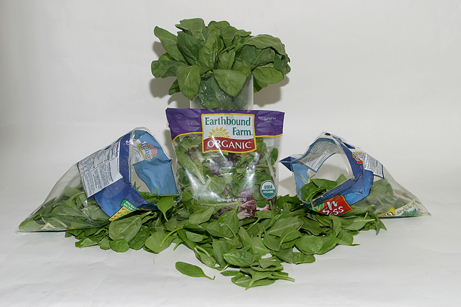
Spinach is among the top 10 commodity crops grown in San Benito
County
By ANDREW BRIDGES
Associated Press Writer
WASHINGTON and HOLLISTER (AP)
– Spinach was absent from grocery store shelves, restaurant
menus and family iceboxes this week after an outbreak of E. coli
led a San Juan Bautista company to recall packages of the leafy
green from across North America.
But the economic effects for San Benito County will likely go
beyond the supermarket shelves.
Spinach is among the top 10 commodity crops grown in San Benito County
By ANDREW BRIDGES
Associated Press Writer
WASHINGTON and HOLLISTER (AP) – Spinach was absent from grocery store shelves, restaurant menus and family iceboxes this week after an outbreak of E. coli led a San Juan Bautista company to recall packages of the leafy green from across North America.
But the economic effects for San Benito County will likely go beyond the supermarket shelves.
It will be some time before the economic implications of the recall, as well as the shift in consumer buying patterns, will affect Natural Selection Foods in San Juan, which distributes the Earthbound Farm brand. But local spinach growers are threatened by any large-scale consumer shift away from leafy green vegetable.
Spinach is among the top 10 commodities grown in San Benito County, and has been growing. Last year the county produced nearly $14.8 million worth of spinach, up from 2004’s total production of $14.6 million.
Federal health officials linked prepackaged spinach distributed by Natural Selection Foods LLC throughout the United States, Canada and Mexico to the ongoing outbreak, which has killed one person and sickened nearly 100 others in 19 states, including seven in Ohio. No foreign cases are known.
Food and Drug Administration officials said food poisoning victims reported eating Natural Selection Foods spinach before getting sick.
The officials stressed that the bacteria had not been isolated in products sold by the holding company, based in San Juan Bautista, and known for Earthbound Farm and other brands. As the investigation continues, other brands may yet be implicated.
Prepackaged spinach in recent years has soared in popularity, particularly among women over 40, according to the Agriculture Department.
Each year, consumers buy more than 500 million pounds of triple-washed raw spinach, packaged in cellophane bags and clamshell boxes.
Earthbound Farm, which claims it pioneered the retail market in pre-washed, bagged salads in 1986, says its spinach and other products are in 74 percent of U.S. grocery stores.
It also sells spinach to restaurants and other establishments that serve food. The National Restaurant Association said members were pulling spinach from their menus.
The recall earned the praise of Tom Stenzel, president and chief executive officer of the United Fresh Produce Association.
“The FDA investigation and the voluntary action taken by Natural Selection Foods LLC help narrow concern about any continuing risk, and begins to ensure that product that may be potentially contaminated is removed completely from the food supply,” Stenzel said in a statement.
Meanwhile, a Seattle law firm said it planned to add Natural Selection Foods on Monday to federal lawsuits already filed in Wisconsin and Oregon that named other spinach producers.
Not all strains of E. coli cause illness. Laboratory analysis has confirmed that the same strain, called O157:H7, is responsible for the current outbreak.
The spinach could have been contaminated in the field or during processing, according to the Centers for Disease Control and Prevention. Boiling contaminated spinach can kill the bacteria, but washing will not eliminate it.
Ohio reported four illnesses in Franklin County, two in neighboring Fairfield County and another involving a 15-year-old in Preble County, west of Dayton, who has since recovered.
Wisconsin accounted for 29 illnesses, about one-third of the cases, including the lone death. The victim’s son identified her as Marion Graff, 77, of Manitowoc, who died of kidney failure Sept. 7.
Other states reporting cases were California, Connecticut, Idaho, Indiana, Kentucky, Maine, Michigan, Minnesota, New Mexico, Nevada, New York, Oregon, Pennsylvania, Utah, Virginia, Washington and Wyoming, according to the CDC.
In most outbreaks, the number of confirmed reports of illness is usually only the “tip of the iceberg,” the agency said.
Pinnacle City Editor Dennis Taylor contributed to this report.









